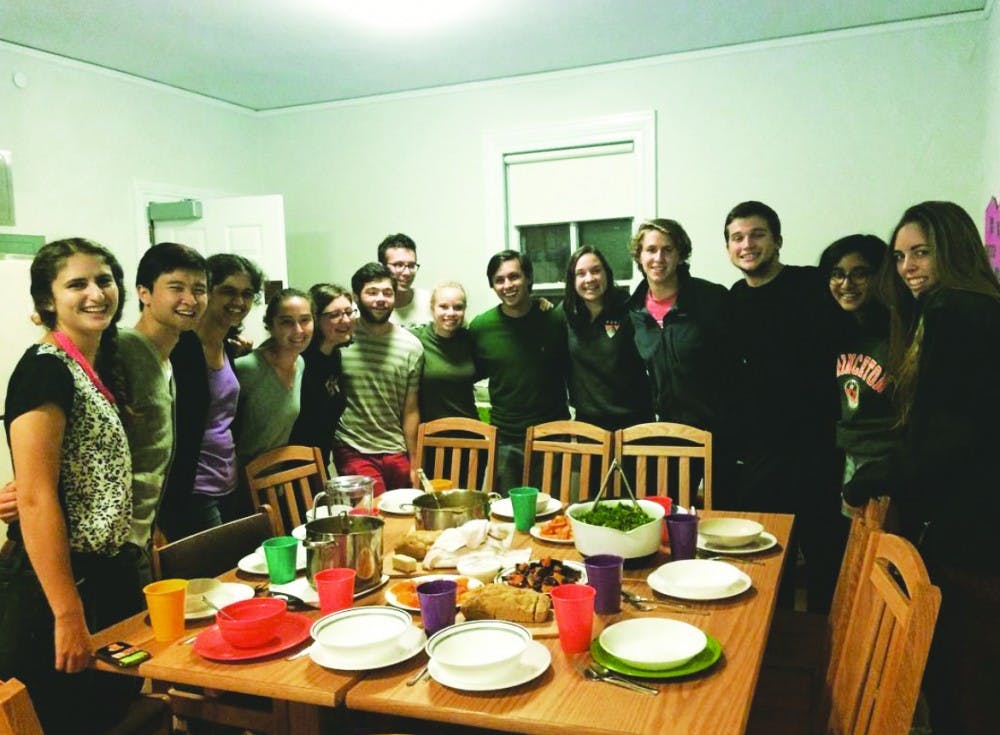Princeton says it stands for sustainability. It says it stands for diversity and inclusion. And it says it stands for affordable eating options available for all students, regardless of their socioeconomic background.
Pink House embodies these values. Four years ago, University students founded the Pink House: Social Sustainability Project, which grew to involve a food-share centered on providing affordable, plant-based eating. For me, the Pink House kitchen has become a home, a place where I am able to bond with peers over delicious meals and shared values, a place where members can learn from each other about mindfulness and sustainability. Now the University is making the house available to Forbes College students only, kicking out a vast portion of the student body and most likely ending the food-share.
The imminent demise of Pink House is just the latest attempt by the University to undermine the formation of student-initiated food-share communities. The last time the University approved the formation of a new co-op was three years ago. It is an open secret that the administration refuses to approve any new alternative dining options in hopes of getting more students on the meal plan. The latest student proposal to turn the financially struggling Charter Club into a co-op was turned down by alumni.
For years, Princeton students have been demanding more affordable eating options on campus. Currently, there are over 300 students waiting to join one of the campus’ five co-ops or the food-share in Pink House. Closing Pink House only means one thing: fewer students will have access to affordable eating next year.
The difference in cost is striking. The unlimited dining hall meal plan costs more than $7000 a year. Members of the Pink House food-share pay less than $600. Yes, the unlimited meal plan provides three meals a day plus late meal. Pink House provides dinner and the ingredients to make breakfast and lunch. But even the dining hall’s Block 105 plan, which provides eight to nine meals a week and is thus comparable to what Pink House provides, costs $2850.
These figures demonstrate that the food-share system makes eating significantly more affordable for upperclassmen than any meal plan ever could. By closing Pink House and its food-share, the University is unfairly targeting lower-income students who often cannot afford the high fees needed for an eating club or dining hall plan, and instead find a home in a food-share that teaches them how to be self-sufficient — a skill that we rarely learn while at Princeton.
By ending the Pink House project, the University is further making a statement against unequivocally inclusive communities on campus. The Pink House food-share operates in only one room, the kitchen of 99 Alexander Street, with one big table at which members share their meals. It is literally impossible to sit apart from others or avoid meeting every member of the food-share. At dinner, the kitchen buzzes with the energy of members and guests that have found their way to Pink House after spending their day in all different parts of campus.
We never close our doors to anyone.

When Pink House was founded as a Forbes College project by sustainability-oriented students in 2016, it was created as a space for open discussion about social justice and environmental consciousness. Positioned between Forbes and the wider campus community, it was meant to foster a sense of collective responsibility among Princeton students. Through its collaboration with the Gardening Project, its support of local farmers, and its organization of programming such as nature walks, pickling events, and mending workshops, it serves as a successful ambassador of sustainability on campus. Closing Pink House to non-Forbes students is an attempt to obliterate the food-share and its sustainability-driven mission.
No other place on campus is comparable to Pink House. What comes closest is Mathey College’s Edwards Collective. But the collective allows anyone to join who is interested in its mission to foster creativity on campus, regardless of a student’s residential college affiliation. By excluding non-Forbesians from Pink House, Forbes College is excessively exclusive to the rest of the student community.
About 24 students regularly eat at Pink House, often inviting the broader student and faculty community to join. In less than four months, there will be no more delicious food awaiting them and no more smell of fresh vegan banana bread greeting them at the door. The chairs around the large table will be empty and there will be no more lively discussions about sustainable living and cooking. And — most importantly — there will be one less community on campus brought together over shared values, an interest in environmentalism, and a need for a home.
It’s time for us to start the conversation with University administrators about the urgent need for more co-ops and affordable eating options on campus in order to preserve and create the kinds of inclusive, welcoming communities we want to be part of at Princeton.

Anna Wolcke is a senior from Münster, Germany. She can be reached at awolcke@princeton.edu.








